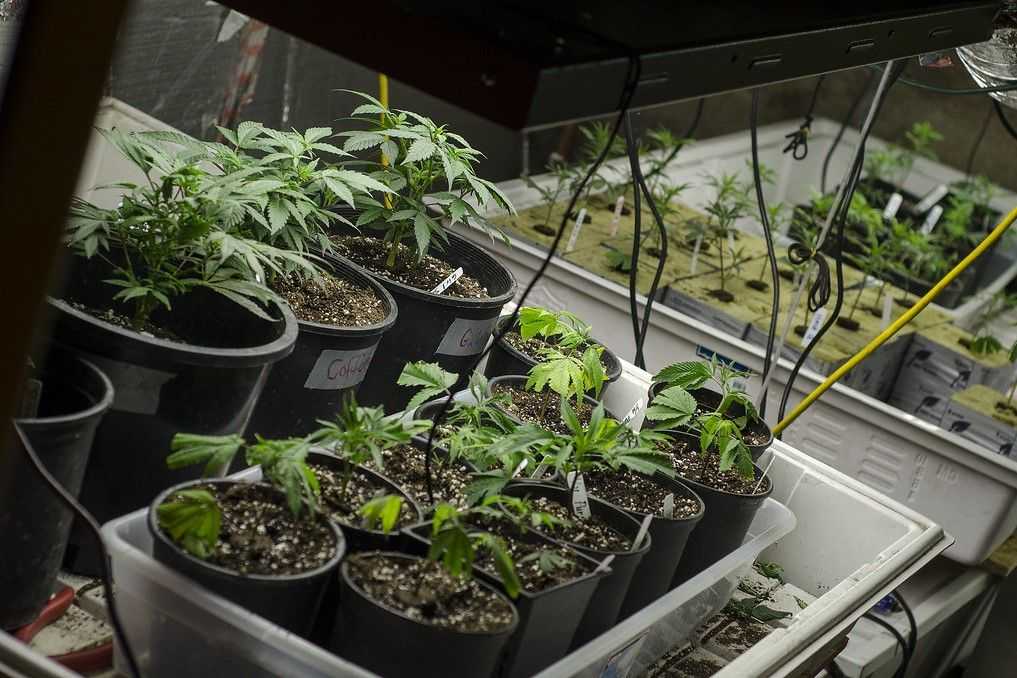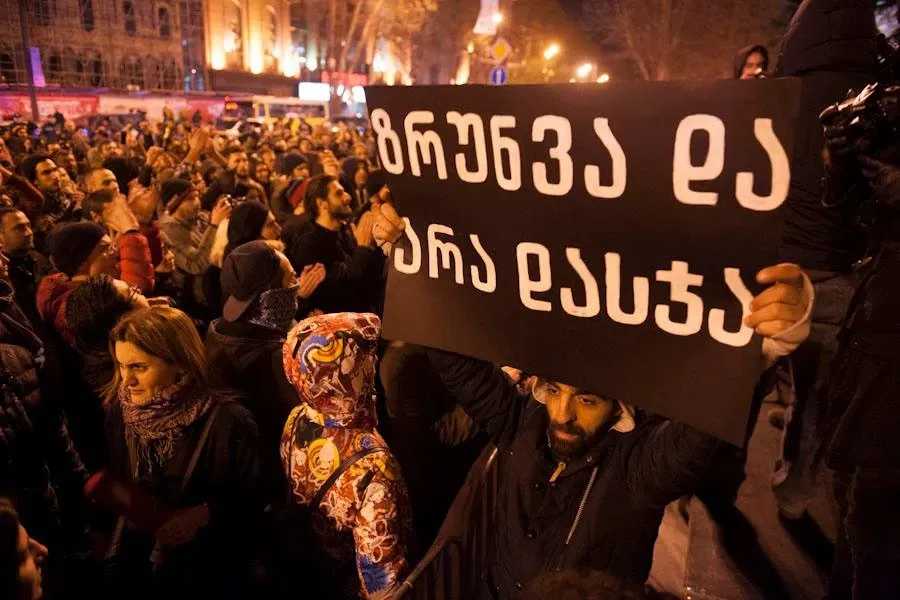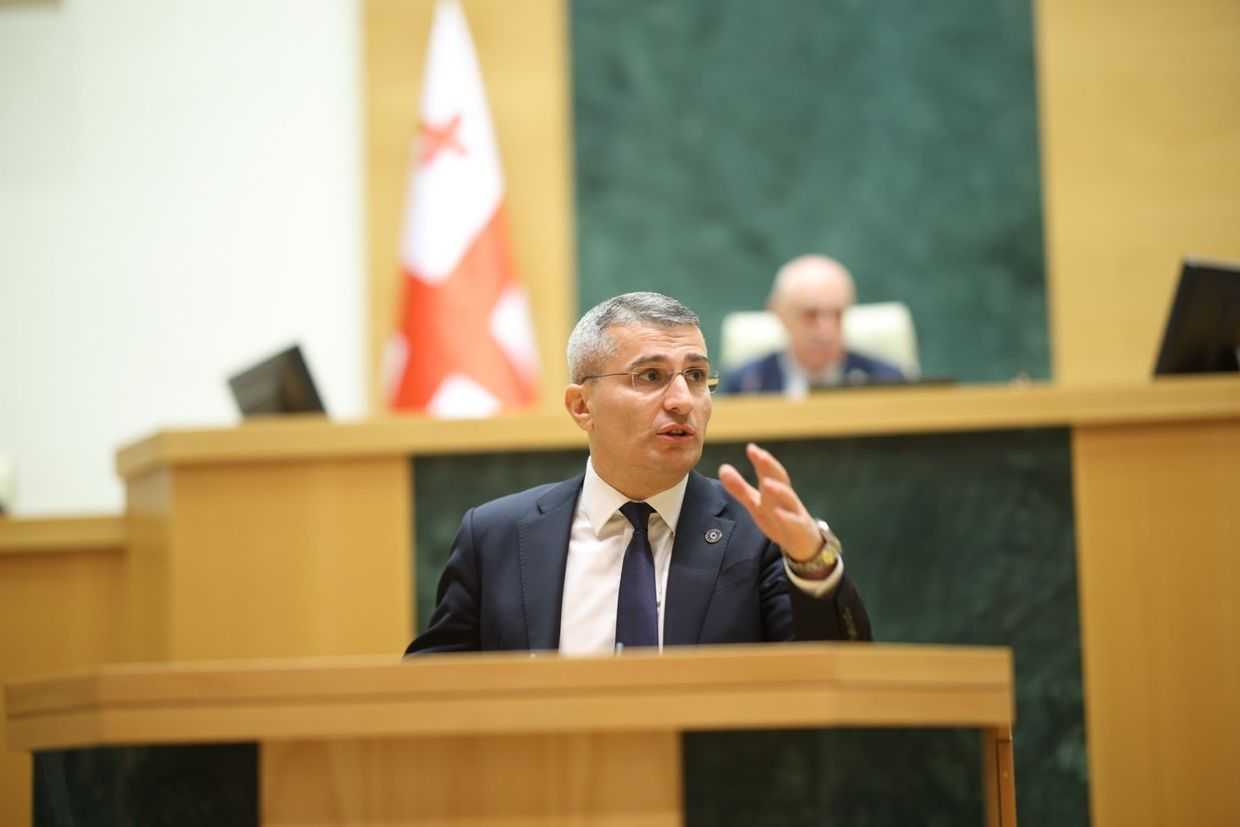
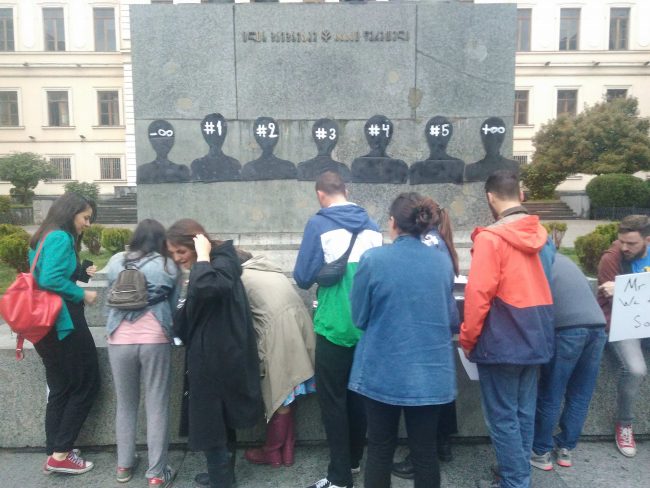
 Several dozen have gathered on 8 May in front of Tbilisi Public School No 1 to ‘pay respect’ to those who died from ‘unidentified substances’. At least four passed away in their sleep in the last two weeks in Georgia, allegedly from drug overdose after visiting nightclubs.
Several dozen have gathered on 8 May in front of Tbilisi Public School No 1 to ‘pay respect’ to those who died from ‘unidentified substances’. At least four passed away in their sleep in the last two weeks in Georgia, allegedly from drug overdose after visiting nightclubs.
Participants of the rally demanded from the Georgian government to change the ‘existing fascist drug policy’ and urged the parliament not to abandon a bill aimed at its liberalisation.
[Read more on OC Media: Georgia’s ‘war against the people’ and the war against a ‘system that stinks’]
Speaking to OC Media, Tsotne Khetsuriani, 25, said he and his friends came to the rally in solidarity with the victims of the current drug policy and wanted to know why the parliament failed to advance the liberalisation bill. For Ana Lortkipanidze, 30, liberalisation ‘does not mean that heavy drugs should be legalised, but it [using them] should not be a reason for criminal prosecutions and repressions’.
‘All of us have lost friends, family members, or fellow citizens, which is painful, so we have to stand together and take care of each other, especially when the state fails to do that. After the first fatality became known, neither the Ministry of Internal Affairs nor the Ministry of Health made any statement to warn or inform the public. Young people who died later could have been warned, the next fatalities might have been averted’, said Nutsa Asatiani, 24.
Eventually, a statement to abstain from using unknown substances was made by the Ministry of Health later that day.
It remains unclear if the recent deaths are related to the same substance. According to RFE/RL’s Georgian service, the Samkharauli National Forensics Bureau says that the examination of two of those deceased could take more than a month to give conclusive results.
Stalled reform
Later that day, the Parliament Committee on Healthcare and Social Issues postponed the hearing of the draft law for the third time — the bill was submitted by the Committee Chair, Akaki Zoidze together with other MPs last June. Zoidze and his colleagues initiated the bill on behalf of its author — the Georgian National Platform on Drug Policy. The bill envisages measures like decriminalisation of using and possessing substances in small amounts, and the development of treatment and rehabilitation centres and other social services for drug users.
On the same day, the umbrella organisation for several public movements, the Georgian Network of People Who Use Drugs (GeNPUD) urged the government to ‘immediately identify and provide the public with information’ on the lethal substance. GeNPUD threatened to go on a hunger strike in 10 days if the bill prepared by the National Platform on Drug Policy, uniting more than 40 NGOs, including drug users community, researchers, and activists, remains stalled in the parliament.
‘Managing public opinion’
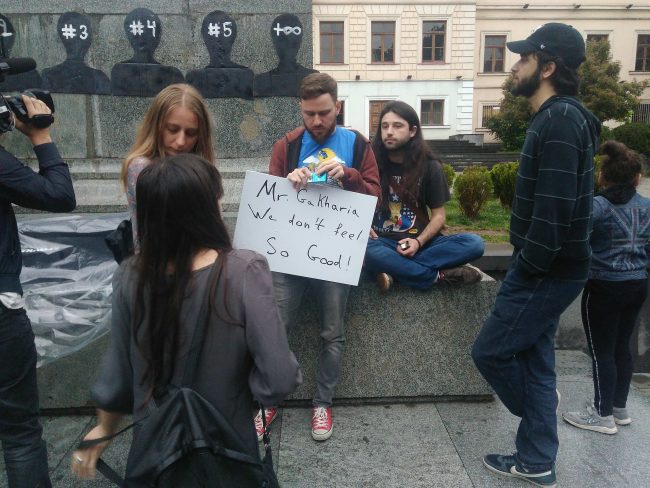
After the latest overdose casualties on 5 May, the White Noise Movement (WNM), a group advocating for a humane drug policy reform and frequent organiser of protest rallies, was one of the first to put out an ‘urgent’ statement calling everyone to ‘refrain from using any substances’. WNM identified mephedrone and fentalyn and other, unknown substances distributed under those names as lethally dangerous.
The group criticised the authorities for failing to change the drug policy and remaining silent during the recent deaths. Moreover, WNM’s statement even suggested that the latest casualties from lethal drugs introduced onto the black market could be the result of a ‘targeted sabotage’ against the activists’ ongoing efforts to push the government towards the path of drug policy liberalisation.
‘This is just a theory’, WNM’s activist Davit Subeliani told OC Media. ‘But even if this [the deaths] is an effect of the black market, they still keep postponing hearings of the new bill and try to change the narrative by blaming everything on clubs or “reckless” drug users, so it becomes apparent that they [the authorities] are at least using the recent developments as an opportunity to stall the reform process’.
Subeliani also pointed out that after every case of fatal drug overdose, the Ministry of Internal Affairs immediately detains several drug dealers in order to reinforce its image of ‘fighting drugs’, which, according to him, is ‘a routine form of managing public opinion’.
The arrests
On 7 May, two days after the latest cases of lethal overdose that triggered public outcry and wide national media coverage, the Ministry of Internal Affairs reported arrests of seven ‘big drug dealers’.
The following day the Ministry of Internal Affairs announced that they apprehended two more individuals suspected of selling illegal drugs online. After a briefing on the arrests, the Deputy Interior Minister, Natia Mezvrishvili expressed her disapproval with the ‘talks’ that portray heroine or synthetic drugs other than mephedrone as ‘benign’, adding that ‘the endless talks about liberalisation’ popularise drug offences and hinder prevention. ‘Fighting drug crime is one of the priorities of the Ministry of Internal Affairs and this fight, in light of the present challenges, will only intensify’, said Mezvrishvili.
‘Drug liberalisation’ under fire
Leader of the Parliament majority Archil Talakvadze reiterated the Georgian Dream’s support for the policy changes that would focus on prevention, but also called for ‘bigger support for the law enforcement agencies in its fight against organised drug crime’. Later that day, speaking with journalists, Health Minister Davit Sergeenko dismissed the idea of ‘drug liberalisation’ and advocated for a strategy in favor of the ‘reduction of supply and usage’ of drugs.
For WNM’s Subeliani, the minister’s language suggests that he seems to be still pushing an ‘alternative’ bill, which trims down the whole drug policy reform to determine quantities of several substances. The activist deems Sergeenko’s approach to be ‘incompetent’, stressing the need of a comprehensive overhaul of the whole drug policy.
‘Until there is a fear of repression by law that precludes professionals and drug users to work together, it will remain impossible to change anything’, Subeliani told OC Media.
Parliament Speaker Irakli Kobakhidze confirmed that there was no consensus and the fate of the bill would be decided in the following weeks. ‘The ruling [Georgian Dream] party is neither for a stricter drug policy nor for liberalisation. The main objective is to reduce the usage of drugs, and to have a criminal law as rational as possible’, said Kobakhidze.
Nightclub calls for healthcare and prevention-based policy
Political reactions to recent casualties of drug overdose included intensified calls for the shutting down of the popular nightclub Bassiani — a social venue where drugs are allegedly available to youth. Megi Gotsiridze from the opposition United National Movement claimed that former Prime Minister Bidzina Ivanishvili’s son owns the club. Bera Ivanishvili quickly responded and denied the ownership, adding that he and his family hoped the alleged overdose cases were fully investigated and that the perpetrators [engaged in selling or distributing drugs] would be ‘harshly punished’.
Bassiani insists that no drugs are sold in the club and no one died or was in danger throughout the five years of its operation. Bassiani claims that the Georgian club scene is being targeted and discredited by ‘regressive’ and ‘pro-Russia forces’, and again calls for better healthcare and prevention-based policy as a solution to the problem of lethal drugs.




